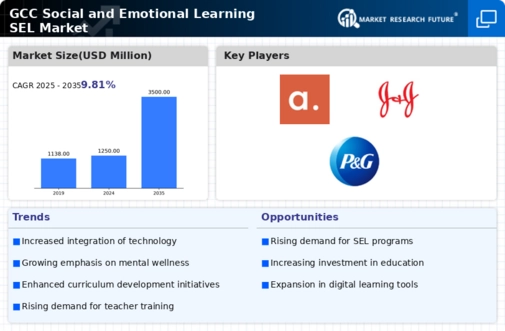Collaboration with Private Sector
The collaboration between educational institutions and the private sector is emerging as a significant driver in the GCC social emotional learning market. Private organizations are increasingly partnering with schools to provide resources, training, and innovative SEL programs. This collaboration is particularly evident in the UAE, where tech companies are developing digital platforms that facilitate social emotional learning. Such partnerships not only enhance the quality of SEL offerings but also increase accessibility for students across the region. As the private sector continues to invest in educational initiatives, the GCC social emotional learning market is likely to experience substantial growth, driven by the integration of technology and innovative practices into traditional educational frameworks.
Government Initiatives and Funding
Government initiatives play a crucial role in shaping the GCC social emotional learning market. Various GCC countries are increasingly allocating funds to enhance educational frameworks that incorporate social emotional learning. For example, Saudi Arabia's Vision 2030 emphasizes the importance of holistic education, which includes emotional and social competencies. This strategic focus is likely to result in increased funding for SEL programs, thereby expanding the market. Additionally, the establishment of national policies that support mental health and emotional well-being in schools indicates a commitment to fostering environments conducive to learning. Such government backing is expected to catalyze growth in the GCC social emotional learning market, as schools adopt evidence-based practices to improve student outcomes.
Growing Awareness of Mental Health
The GCC social emotional learning market is experiencing a notable increase in awareness regarding mental health issues among students. Governments and educational institutions are recognizing the importance of mental well-being in academic success and overall development. For instance, the UAE has implemented various initiatives aimed at promoting mental health awareness in schools, which has led to a rise in demand for social emotional learning programs. This growing awareness is likely to drive investments in SEL curricula and training, as stakeholders seek to equip educators with the necessary tools to support students' emotional needs. Furthermore, the integration of mental health education into school curricula is becoming a priority, suggesting a robust future for the GCC social emotional learning market.
Increased Focus on Holistic Education
The GCC social emotional learning market is witnessing a paradigm shift towards holistic education, which encompasses not only academic achievement but also emotional and social development. Educational authorities in the region are increasingly recognizing that fostering emotional intelligence is essential for preparing students for future challenges. This focus on holistic education is evident in initiatives such as Qatar's National Vision 2030, which aims to develop well-rounded individuals. As schools begin to implement comprehensive SEL programs, the market is likely to expand, driven by the demand for curricula that address the emotional and social needs of students. This trend suggests a promising future for the GCC social emotional learning market, as educational institutions strive to create supportive learning environments.
Cultural Shifts Towards Emotional Intelligence
Cultural shifts within the GCC region are increasingly recognizing the value of emotional intelligence in personal and professional success. The GCC social emotional learning market is benefiting from this trend, as parents and educators alike are advocating for the inclusion of SEL in educational settings. This shift is reflected in the rising demand for programs that teach students how to manage emotions, build relationships, and make responsible decisions. As the workforce evolves, the emphasis on soft skills, including emotional intelligence, is likely to grow, further driving the need for effective SEL programs. Consequently, educational institutions are expected to adapt their curricula to meet these changing societal expectations, thereby enhancing the GCC social emotional learning market.













